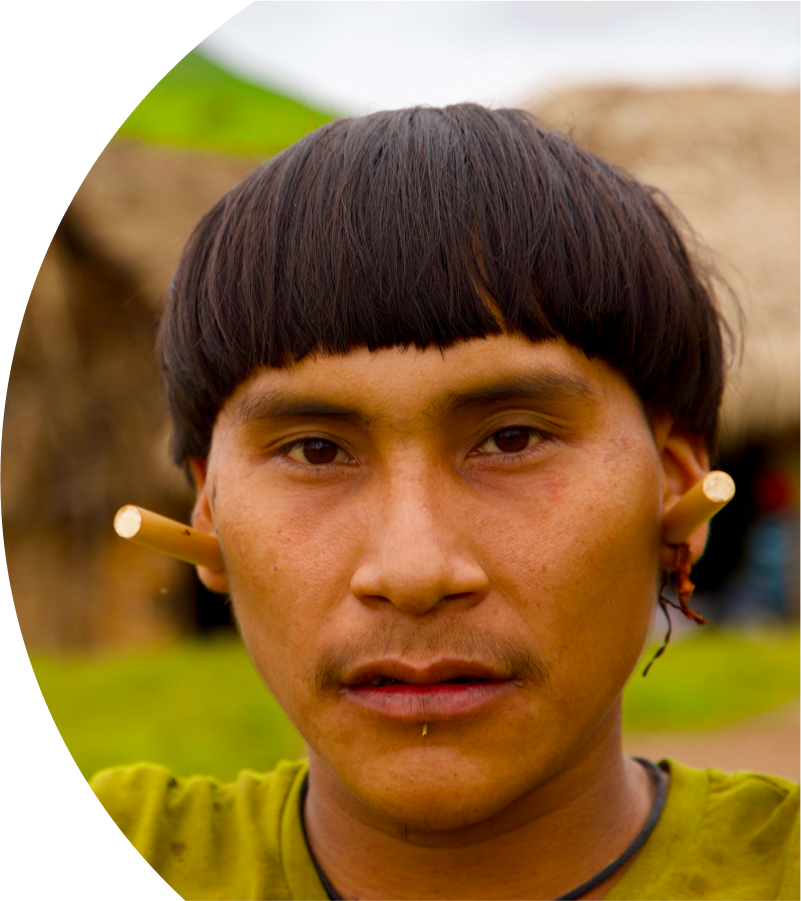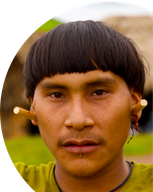



Health
Programs


The Carter Center partners with the governments of Brazil and Venezuela to treat river blindness among the indigenous Yanomami people who live in the Amazon rainforest.

Guinea Worm Eradication Program
Only 14 human cases of Guinea worm disease were reported in 2023. The number is close to the lowest annual total of human cases ever reported, following 13 cases in 2022 and 15 cases in 2021. Nine of the cases in 2023 were reported in Chad, two in South Sudan, and one each in Cameroon, Central African Republic, and Mali. While infections in animals rose 4% in 2023, because of expanded surveillance in Angola and Cameroon, Chad reduced canine Guinea worm infections by 22%, its fourth consecutive year of progress.
The Carter Center works with ministries of health to train and coordinate 30,000 volunteers in 8,000 communities to conduct surveillance, health education, case containment, filter distribution, and water treatments. Health workers meticulously investigate all rumors of potential cases, which are key to finding actual cases and infections. To further boost surveillance, all endemic countries offer cash rewards for reporting cases and animal infections. Community-based and innovative behavioral change and local mobilization are the key drivers of success.
A woman and two girls fetch household water from a well in Tarakoh village, Chad.
Tireless Tracking of Guinea Worm
Carter Center staff can name every person in the world with a Guinea worm. In 2023, 14 people suffered from the parasitic infection that can cause disability and contribute to community poverty. As the Center inches closer to eradicating the disease, relentless surveillance and tracking by volunteers and staff in seven countries are required to reach the goal of zero cases of the disease.
For example, in 2023 in Chad, nine people were confirmed to have had a case of Guinea worm disease. Of those, six were children. Five of the nine were female. Three of the nine were farmers. Almost half lived in the same village.
Digging deeper, Carter Center staff note that the village with four cases currently lacks a safe source of drinking water, significant because the parasite breeds in stagnant pools of water and can be easily ingested by people and animals.
As the numbers of people and animals with Guinea worm disease dwindles, efforts to thoroughly investigate every single case ramp up so that infections can be contained, eventually leading to eradication and a brighter future for those in affected communities.
River Blindness Elimination Program
Through decades of hard work, transmission of river blindness (onchocerciasis) has been eliminated in four of six formerly endemic countries in the Americas and in large swaths of four African countries with assistance from The Carter Center. In Brazil and Venezuela, the program continues to deliver treatments of Mectizan® (donated by Merck & Co., Inc., Rahway, N.J., USA) to around 38,000 indigenous people living deep in the Amazon Rainforest in the last known transmission area in the Americas. In 2023, seven districts in Uganda encompassing 1.1 million people met World Health Organization criteria to stop mass drug administration of Mectizan, while the Galabat area of Sudan confirmed transmission elimination for approximately 140,000 people after three years of post-treatment surveillance. In Nigeria, seven of nine Carter Center-assisted states have met stop-treatment criteria. The Carter Center laboratories in Nigeria and Ethiopia processed over 90,000 dried blood spot samples and 50,000 fly samples in 2023 to monitor progress toward disease elimination.
Trachoma Control Program
Despite the country’s longstanding security challenges, the World Health Organization validated Mali as having eliminated the painful, blinding eye disease trachoma as a public health problem in 2023. The Carter Center’s trachoma partnership with Mali began with a visit by former President Jimmy Carter in 1996. The Center continues to fight trachoma in some of the most insecure nations in Africa: Ethiopia, Niger, South Sudan, and Sudan. The Center partners with these countries and many other organizations to prevent trachoma through mass drug distribution, preventative surgical services, improved water and sanitation, and behavioral change education.
Reaching Surgery Camps Takes Grit
In South Sudan, a 15-minute surgical procedure can save a person’s sight. Reaching the people who perform that procedure is another matter.
In a country the size of Texas with only 250 miles of paved roads, people often travel long distances — frequently on foot — to reach eye surgery camps, where the painful and advanced stage of the bacterial eye disease trachoma can be corrected. The free camps are sponsored by The Carter Center.
Several years ago, one man walked 200 miles with his son, who needed the surgery, stopping along the way as he chased rumors of camps before finally reaching one at the right time. Another time, two men carried a parent in a wheelbarrow to receive surgery because the parent could not walk. In another example, a man and his pregnant wife walked for hours to reach a camp offered in a small dirt-floor church.
Center staff realized that some women were reluctant to get surgery because their child-rearing responsibilities made a night away from home — required post-surgery — impossible. The Center erected hospital tents and told women they could bring their children with them, everyone receiving meals and lodging overnight.
The impact: 2,201 people in South Sudan received free sight-saving surgery for trachoma in 2023.
A South Sudanese woman waits to have her bandage removed after receiving surgery the previous day for advanced trachoma.
Schistosomiasis Program
The Carter Center assists the Nigerian Federal Ministry of Health to distribute medication to millions of schoolchildren to control schistosomiasis. Also known as snail fever, schistosomiasis causes urogenital and intestinal problems that can lead to organ dysfunction and anemia. Since 1999, the Center has assisted in over 30 million treatments, given by teachers or community drug distributors to prevent schistosomiasis and improve health in Nigeria.
Lymphatic Filariasis Elimination Program
The Carter Center combats lymphatic filariasis in Ethiopia and Nigeria with medicine donated by Merck & Co., Inc., Rahway, N.J., USA (Mectizan®) and GSK (albendazole). Thanks to years of consistent high treatment coverage, seven districts encompassing 400,000 people in Ethiopia and 3.7 million people in 17 districts in Nigeria met World Health Organization criteria to stop treatment for lymphatic filariasis in 2023. Ninety percent of formerly endemic areas assisted by The Carter Center in Ethiopia and Nigeria now no longer need treatment for the disease. The Hispaniola Initiative section highlights additional work to eliminate lymphatic filariasis in the Dominican Republic and Haiti.
Guerla Joseph lives with lymphatic filariasis, a parasitic disease that has caused permanent swelling in her right leg.
Derailing a Debilitating Disease
Guerla Joseph’s right leg is a weight, in more ways than one. With her leg severely swollen from lymphedema, Joseph finds it hard to move around physically. Her condition has also exacted a mental toll. She said that other people in her Dominican Republic community of farmworkers sometimes look at her in a way she doesn’t like.
The underlying cause of the swelling in Joseph’s leg is lymphatic filariasis, a parasitic disease transmitted by mosquito bites. The Carter Center has been working with Haiti and the Dominican Republic since 2008 to eliminate lymphatic filariasis and malaria from their shared island.
The 49-year-old mother of six said the disease prevents her from working. “I do what I can do,” she said, “but I have difficulty moving around because of the leg.”
Although there’s no cure for Joseph, the Center’s work on the island is paying off. A recent blood-sample survey demonstrated that transmission of lymphatic filariasis has been eliminated as a public health problem from the Dominican Republic.
Joseph said she is glad to know that in the future, no one will have to worry. “It’s good that kids won’t get this disease,” she said.
Hispaniola Initiative
Surveys conducted in 2023 in Haiti confirmed that lymphatic filariasis, also known as elephantiasis, has been eliminated as a public health problem in the Nippes and Sud-Est regions of the country. A similar survey was launched in the eastern region of the Dominican Republic in late 2023, and results showed that no one sampled tested positive for the disease. Provisionally, 11,704 cases of malaria were reported in 2023 in Hispaniola — 11,433 in Haiti and 271 in the Dominican Republic. This is a 19% decrease in total cases compared to 2022. In April 2023, on World Malaria Day, The Carter Center and the Dominican minister of health opened a new molecular surveillance laboratory to help the country improve diagnostic capacity to eliminate malaria and other infectious diseases in the country.
Mental Health Program
The Carter Center’s Mental Health Program lost its pioneering founder and greatest advocate with the passing of former First Lady Rosalynn Carter, whose priorities and legacy the Center carries forward. The Carter Center is currently working in three areas: global programs, public policy, and journalism. Mental health system strengthening continues in Liberia; the Center and United Methodist University established the nation’s first master’s program training mental health specialists and is preparing to begin work in Sierra Leone and Uganda. The Center awarded nine Rosalynn Carter Fellowships for Mental Health Journalism to U.S. journalists, started a fellowship in Ireland, initiated the award-winning Mental Health Parity Newsroom Collaborative, and released global guidelines for reporting on mental health. The Carter Center leads in monitoring the implementation of Georgia parity legislation and raising citizen awareness of the right to have insurance coverage for mental health and substance use disorders on par with other illnesses. Parity in payment for mental health services in schools and universal prevention remains a priority.
Hope and Healing for Intergenerational Trauma
More than 40 years after the Khmer Rouge genocide in Cambodia, refugees and their children still suffer from the trauma. Journalist Soreath Hok, herself the daughter of Cambodian refugees, is shedding light on the issue of mental health within the Fresno, California, community of Cambodians.
Hok received a Rosalynn Carter Fellowship for Mental Health Journalism from The Carter Center to report on the issue in a five-part audio series.
“I was interested in exploring my culture of Cambodians and the refugees, and what they’re still dealing with,” she said. “There was a gap in mental health care for this group that has been in the U.S. for decades but hasn’t gotten help for the trauma they experienced.”
Reflecting on her fellowship year, Hok said she was thankful for the opportunity to connect with the legacy of former First Lady Rosalynn Carter, whose vocal advocacy for Cambodian refugees several decades ago impacted Hok’s own journey. “I wouldn’t be here today if she had not had the compassion to recognize that there was this problem happening on the other side of the world.”
Tyler Neang (center) prays alongside his family at the Fresno Cambodian Buddhist Society temple.









